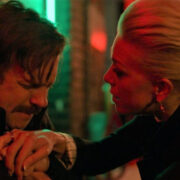Between God & Man Lies A Smoking Gun: Reflections On Meaning, Violence & Redemption In GROSSE POINTE BLANK
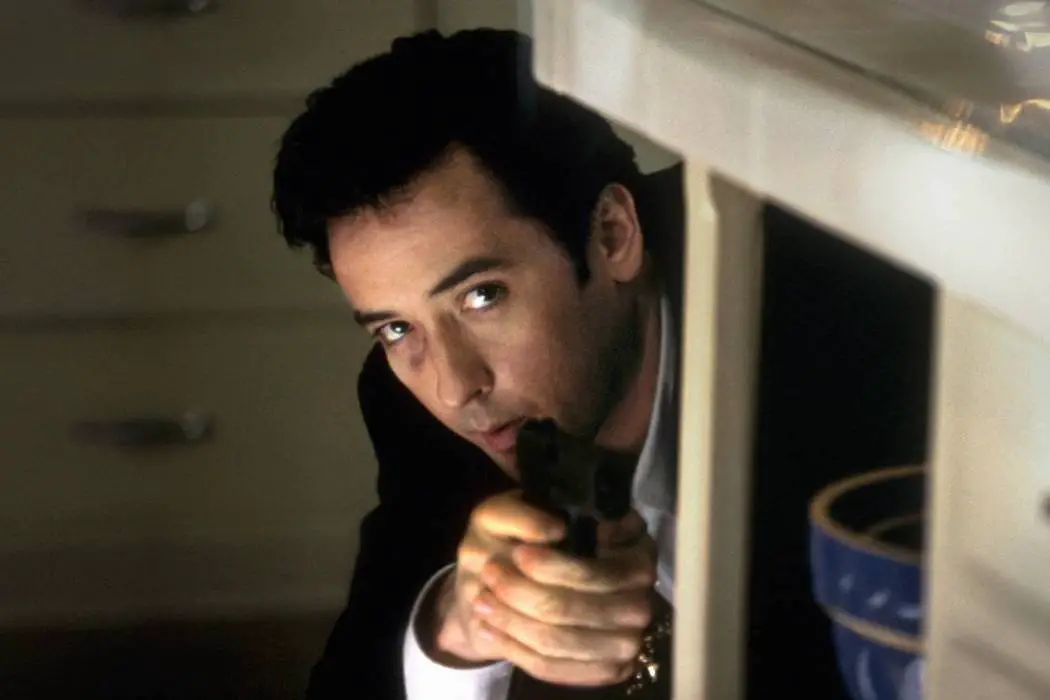
Blake I. Collier hails from the flatlands of the Texas…
I saw Grosse Pointe Blank as a freshman in high school and was struck by the rather bizarre storyline—a hitman attending his ten-year high school reunion—and, of course, by the great moments of action that punctuated its cinematic landscape. I had friends who had a knack for searching for the accuracy of the gunfights in films (Michael Mann was a demigod to them). They would count the gunshots and calculate whether the amount of shots matched the magazine load each specific gun could hold. From what I remember, they found Grosse Point Blank to be fairly accurate. So that created another reason to covet it as a favorite, because it was a way for me to create an identity within this small group of friends.
However, in the twenty sequential years since I first became a fan-boy of the film, I have come to covet the film in whole new ways which would not have even been on my radar in those earlier days. Especially in the last few years, I started to see the redemptive movement of the storyline as presented in the film. Martin Blank (John Cusack) is a severely broken man, though maybe not in the way we like to imagine broken people. We tend to envision people who are addicted to heroin or involved in a drunken joyride that ends in the death of a young family of four. Those are more dramatic examples used in order to avoid the pointing finger from rolling back our own way. Blank’s brokenness displays itself in a much subtler way, a way that might hit a little too close to home for most of us.
Sure, he is a hitman and kills people for a living; that would probably break most people at some point. I think his brokenness is a little subtler than just his career. As the great Southern Catholic novelist and essayist Walker Percy put it, Martin Blank is suffering from a diminishment of being, a detachment from himself. In other words, he does not know himself anymore beyond what he does for a living. He is mere machine, a machine made of blood, flesh, veins and tendons. Unfortunately, the only cure for his brokenness is to be known.
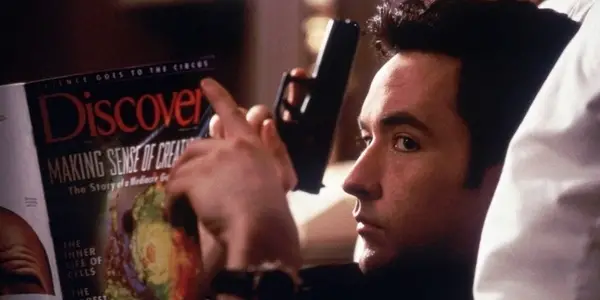
This concept of ‘being known’ is not merely the modernist formulation of knowledge—mere intellectual information—but, instead, something a little closer to what ol’ Saint Paul talked about in the Bible book of Galatians, chapter four. That kind of knowledge implies intimacy between the two parties involved in the act, an intimacy couched in a fierce gracious love within the community. He needs to be found out for what he is, a broken-down, officially-sanctioned killer who is starting to reap the psychological and emotional effects of his past actions and the accompanying loss of humanity.
I say this type of brokenness should hit most of us closer to home, because it is not dramatic, not really. As Debi Newberry (Minnie Driver)—Blank’s high school sweetheart—profoundly states of Martin himself:
“…you’re not broken. You’re mildly sprained; nothing that can’t be mended.”
A lot of us will not have dramatic life stories that speak of overdoses or jail time, but we all suffer in some form; suffering is one of the most universal elements of humanity. We are all diminished in some way, something that we have done or has been done to us that we just can’t seem to shake. Something that follows us around all of our lives as a constant reminder that we are not perfect, that we do not live up to expectations. We need mending and, no matter how hard we try, we cannot seem to mend ourselves. Martin Blank, through the narrative of the film, is forced to confront many ghosts from his past that are converging on this yuppie suburb of Detroit. At the end of that convergence is one of two possible outcomes—death or life—but either way, he will become known to himself and to others. Redemption demands it.
Violence is key to the narrative of Grosse Pointe Blank. It is through various moments of violence that Martin Blank is forced to contend with his past and who he has become. There are multiple storylines that surround Blank’s presence in the town of Grosse Pointe, Michigan. The central storyline revolves around his initial reason for being in town: he was sent to delete somebody—a canary, or whistleblower—in order to make amends for a botched job in Miami which was supposed to look like a heart attack but ended up appearing as two bullets. This job happened to hit the same weekend as Blank’s ten-year high school reunion. This might have been mere coincidence, but, more than likely, it involved the finagling of Blank’s assistant, Marcella (Joan Cusack)—who first brought up the topic of the high school reunion at the beginning of the film and seems to be selling it to Martin as his fate, something that has drawn him there. And, in a sense, she is being quite prophetic.
However, the job was stolen out from under the nose of Martin’s main competitor, a man called Grocer (Dan Aykroyd). In the wake of being passed over, Grocer calls two government suits on Blank, so that they might catch him in the act and delete him either before or after he deletes the canary. As Blank cruises into town in his ’95 Lincoln Towncar, the two government suits are not far behind. After Blank’s first, unsuccessful, attempt at reconnection with his high school sweetheart, Debi Newberry, he recognizes a peculiar looking man walking down the street, sizing him up, while ineffectively acting like an average denizen of the city. We come to find out that Blank has a whole other hit on his head, but, this time, due to some unfortunate collateral damage involving the detonation of a millionaire’s prized dog, Boudreaux.
On top of all of this, he is half-heartedly advised by his psychiatrist, Dr. Oatman (Alan Arkin)—who told Martin that he no longer wanted to be his psychiatrist after learning what he did for a living, but all to no avail—to go to the high school reunion in a rather poignant and funny scene. The dialogue between doctor and patient here is key to setting up the redemptive turn of the film:
Martin:“I’m feeling uneasy, man. I’m just feeling dispassionate. I’m bored. It’s hard to stay in a good mood. I have problems with work, you know, concept-execution stuff and I’m just ill at ease.”
Dr. Oatman: “Well, look, Martin, I don’t want to suggest anything that might be uncomfortable for you, but you might consider, just consider, the possibility that part of your problem, part of what is making you so miserable is the angst over killing a lot of people. Maybe, just put it in the background there.”
“Come on! I show up at your door, chances are you did something to bring me there. Okay. I don’t care about that stuff.”
“You don’t care about what stuff?”
“Morality.”
“Hmmm.”
“I don’t want to talk about work, cuz I don’t think that necessarily what a person does for a living reflects who he is.”
…
“Don’t kill anybody for a few days, see what it feels like.”
“Alright, I’ll give it a shot.”
“No! No, don’t give it a shot. Don’t shoot anything!”
There is a subtle fear that is alluded to here in the words of Blank: the fear of being found out, being known for who he really is in all of its violence. However, to be found out—being known—is essential to being redeemed as a person and Martin Blank is no different in that aspect than any of the rest of us. He has become nothing more than the battery bunny with handguns and silencers instead of cymbals. Regardless of what he says, what he does for a living has become a reflection of who he is just as Narcissus’ reflection was a representation of who he really was. It is these internal conflicts, along with the external threats of death that are converging upon him as he enters Grosse Pointe, MI. And these convergences find their resolutions in moments of violence as the film plays out.
“It’s Not Me…Why Does Everyone Think It’s Personal?!”
There are a couple of repetitive pieces of dialogue that run throughout the film and both are essential to the understanding of the redemptive movement of the film. The first piece of dialogue is Martin Blank’s declaration of ‘it’s not me’ during four different scenes in the film, all of which come during significant violent moments in the film.
Martin, towards the beginning of the film, makes the first declaration during his botched hit in Miami. He is supposed to drop poison into the opened mouth of a man while he is in REM sleep in order to cause him to go into cardiac arrest. The poison slides down the string—in true James Bond homage—towards the man’s mouth, but, before it can reach its destination, the man’s head turns and the poison hits the man’s cheek and begins to burn his skin as he is woken up. Blank grabs his gun and lunges down the stairs to the room the man resides in, kicks open the door, and places one shot into the man’s chest just as the man raises his gun to take out his assassin. He closes the door and walks towards the disarmed target that is laying, bleeding on the hotel bed. The man looks up at him in desperation and says, “Whatever it is I’m doing that you don’t like, I’ll stop doing it.” Blank states, coldly, “It’s not me,” just as he puts a bullet square in the middle of the man’s forehead.

This simple phrase displays a multitude of possible readings. In one sense, Martin is simply saying that it isn’t him that has reason to kill the guy, but, instead, the person or company that sent him to do it. Though this reading is true in a strict literal sense, a deeper understanding might be more helpful. It seems that by making this statement he is denying his culpability in the death of another human. He is expressing exactly that which keeps the situation from becoming personal and, therefore, exempts him from the moral blame that would befall him if the action were to be narrowly contextualized in a personal encounter between two—and only two—human beings. He is, in effect, declaring himself merely a hired gun. That colloquialism does linguistic violence to those that it names in the sense that they are no longer human, therefore no longer culpable for their actions and a mere weapon in the hands of those with money or power. It will be harder for Blank to continue to hold this stance as the movie goes on.
His second declaration takes place after a shoot-out and explosion take place at the local Ulti-Mart, the business built on the site of Blank’s childhood home. The man assigned to kill Blank for the explosion of Boudreaux, the dog, comes into the convenience store and opens fire on Blank while the oblivious clerk plays an arcade version of Doom at the front of the store and blasts Motorhead’s “Ace of Spades” through his headphones. The assassin proceeds to place C4 explosives in the store’s microwave and Blank just barely pulls the clerk and himself out of harm’s way before the bomb goes off and the convenience store is demolished. It is after the explosion that Blank and the clerk get up off of the grass and Martin asks the clerk if he is alright and he responds, frustrated,
Clerk: “What’d you do that for?”
Martin: “It wasn’t me. Are you all right?”
Clerk: “No, I’m not alright! I’m hurt, I’m pissed, gotta find a new job!”
Once again, we see that literally speaking, Blank is correct, it wasn’t him that blew up the store, hurt the clerk and caused him to be jobless. However, Blank’s declaration is similar to the first in that it is ultimately covering up the real truth of the matter: that Blank’s ugly past actions have directly led to consequences that affected others.
No wrongdoing is without consequences for the person who does them or others around them. Sin, to use a religious term, is never private, but is always a public act whether we see its public consequences or not. All of those people—and dog, in this case—he has killed are coming back to haunt him and the consequences manifest publicly. Once again, Blank’s personal mantra is merely his way of not having to confront the very real and violent nature of what he does and who he has become. However, even now, he doesn’t seem to recognize the deeper truth to his words.
It is not until the dialogue’s third appearance that the audience starts to see a possible crack in Blank’s dialogical façade. In one of the most pivotal scenes of the film, Martin has become, once again, acquainted with Debi Newberry and his best friend, Paul Spericki (Jeremy Piven), and finds himself at his high school reunion. His relationship with Debi starts to mend and those old romantic feelings have been rekindled. They are about to leave the reunion which, like most reunion experiences, has been less than stellar, when Martin decides to stop by his old locker for nostalgia-sake.
It is at this point that Martin’s assassin and he have a realistically choreographed fight—due to the fact that the man playing the assassin was Benny “The Jet” Urquidez, John Cusack’s kickboxing instructor in real life—which ends as Martin drives an ink pen into the neck of the assassin, killing him instantly. Martin is lurched over the assassin’s dead body, his face bruised and bloodied, clothes disheveled and the blood-soaked weapon in his hand. It is at that point that Debi comes around the corner to witness this scene of violence, decontextualized. As she begins sobbing and freaking out at the sight, Martin says, almost despairingly: “It’s not me…It wasn’t me.”
All Martin wants to do, at this point, is justify what Debi witnesses by telling her that it wasn’t his fault the millionaire’s dog was blown up or that the man he killed was a bad man who deserved to die or tell her that it was in self-defense. None of which she gives him the opportunity to air publicly as she runs away before he can say anything to her except this mantra. He is not given a chance to justify himself, but, instead, is seen for what he really is: a killer; warranted or not, at this point, it doesn’t matter. Paul is not far behind Debi and he, too, sees what Martin has done. Martin only half-heartedly tries to justify himself to Paul who, too, doesn’t seem interested in his justifications.
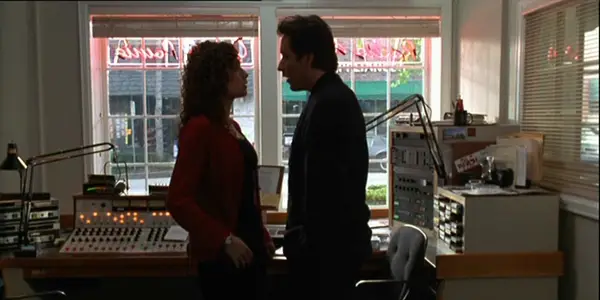
The two people in his hometown that still matter to him, that still care about him, that still love him, now know him. Finally, the audience gets the feeling that Martin has finally felt the linguistic violence of being named something less than human. He is starting to recognize that it is all a lie and that he can no longer deny who he has become. At this point, all of his targets have started to become personal and are beginning to break him down. However, it is exactly this moment of violence, this moment of being known by those that love him, that will engender the beginnings of his redemption.
“I Sell Biscuits and Gravy All Over the Southland.”
The second form of repetitive dialogue surrounds Martin’s multiple attempts at telling those he meets in Grosse Pointe about what he does for a living. The repetitive nature of this dialogue creates some of the most hilarious moments in the film, but beneath the humor lies the profound element of the failure of language to signify meaning if it is spoken without trust in the honesty of the person speaking.
The first of these moments is during the first encounter that Martin has with his high school sweetheart, Debi, after he has driven into Grosse Pointe and come upon Debi’s place of work, the local radio station where she is a deejay. Martin, haphazardly, sneaks into the studio and interrupts Debi’s show. She quickly puts on a song by The Specials and gets out of her chair to address the man who left her in a $700 prom dress to enter the military on prom night, unbeknownst to her. In a moment of true, unadulterated grace, they embrace each other and kiss manically without hesitation as if none of their histories existed and not a day had gone by. It is only after that initial kiss when they actually start to talk to each other that their guards go up and the dialogue becomes awkward to fit the situation. Debi then asks him where he has been the last ten years and this conversation follows:
Martin: “In California, traveling a bit around…on business (gives a confused, guarded look)…”
Debi: “That’s it? That’s ten years?”
“Yeah,…”
“I would have hoped for a great abduction story or something.”
“I’ve had a few thrilling moments here and there, but, you know, flew by.”
“So what’s your business?”
“Professional killer”
“You get dental with that?”
“(laughing) No…”
Debi’s reading of his response to her question about what he does for a living is not taken seriously as is shown by her follow-up comment. She is not able to see the truth of his statement because she does not share the same context in which he is speaking. She does not know that he left her to join the military or that ten years may have turned him into someone more serious and blunt than he may have been as a teenager. His honesty has a bluntness that the audience is caught off guard by as well, because, as Debi says later on in the film, people only joke about the bad things that they don’t do. But, here, Martin is completely honest, but he is cut off from the community where his words would signify any real meaning.
The second scene that incorporates a similar dialogue is between Paul and Martin after they first meet each other after ten years and are driving around in Paul’s car. Paul lights up a joint after probably losing possible buyers for a house he was brokering. Coming out of nowhere, Paul states:
“Ten years, man…Ten years!! Where have you been for ten years?!!”
Martin: “I freaked out, joined the army, went into business for myself, I’m a professional killer.”
“Oh, does that, do you have to do postgraduate work for that or can you just jump right in? I’m curious about that.”
“It’s an open market.”
“Open market, that’s good. Wow… (Momentary silence) Ten years, man!! Ten! Ten years!! Ten Years, TEN, TEN YEARS, ten years!!!”
“I freaked out, I joined the army, I worked for the government, I went into business for myself, I’M A PROFESSIONAL KILLER!!! That’s what I did!!”
“Okay, well, can I join up?”
“YES!!!”
(Both start laughing)
Here again, we see the same response to Martin’s spoken truth by Paul as we did with Debi. Paul, clearly, doesn’t share the same context where Martin’s words would signify the actual truth that underlies them. Once again, Martin is given to telling those he actually still cares about the honest truth and, yet, they are unable to comprehend him because he has isolated himself outside of their community during his ten-year separation from them.

The third example shows Martin lying about his profession because the person he is explaining himself to means nothing to him and happens to be plastered. Amy, one of their high school peers, shows up at the bar where Martin and Debi are getting acquainted again. When asked what he has been up to for that last ten years by his drunken peer, he states, with a hint of humor, “I work at Kentucky Fried Chicken…I do. I sell biscuits and gravy all over the Southland.” Amy’s response follows: “No!…You’re so funny! Funny guy!” At this point, he has no reason to tell the truth, because to this interpreter there is no difference because she won’t even remember what he said in the first place. Meaning and truth are already pearls before swine in this situation. Yet, even in Amy’s drunken state, she recognizes the insanity of his response.
The final person Martin’s truth-telling falls on deaf ears is Debi’s dad, Bart Newberry (Mitchell Ryan). He has come to pick Debi up in order to go to the high school reunion and she tells him that her dad wanted to see him. He goes into the living room where Bart is reading a newspaper and drinking scotch and makes his presence known:
Bart: “I don’t know where you’ve been since you abandoned my daughter ten years ago, and I don’t care. It’s good that you left. I’m glad that you did. You’ve grown up a bit. Did I have you figured wrong?”
“Well, I don’t know. I hope so.”
“I visualized you in a haze, as one of those slackster, flannel-wearing, coffee house misanthropes I’ve been seeing in Newsweek.”
“No, no, no, I went the other road. Six figures. Doing business with lead pipe cruelty, mercenary sensibility, you know, sports, sex, no real relationships with anybody. How about you? How have the years been treating you?”
“Well, you know me, Martin, same ol’ sellout. Exploiting the oppressed.”
“Sure.”
“Oh, what a piece of work is man, now noble…(pauses)…ahh, f*ck it, let’s have a drink and forget the whole damn thing.”
…
“Whatcha’ been doing with your life?”
“Ahh, well, professional killer.”
“Ah! Good for you, it’s a growth industry.”
Mr. Newberry does not share Martin’s context for signifying the truth of his words either, but, unlike Debi and Paul, Martin is speaking to him, at first, in order to prove something. However, once he sees that Mr. Newberry is apathetic about his reappearance in the life of his daughter and that he just, generally, does not care one bit about Martin’s life or what he has been doing, he tells the truth with a sarcastic tone undergirding it. When Mr. Newberry actually asks him what he does for a living in a straightforward fashion, Martin tells him what he told Debi and Paul and the response is, once again, a smart comment, which betrays the truthfulness of Martin’s revelation.
In each of these scenarios, Martin’s language signifies nothing meaningful to those he reveals the truth to, because he is isolated from their interpretative community and they are removed from his because they do not share the same context in which the truth he reveals would be taken with the authority that it actually deserves. However, once Martin is seen for who he really is, Debi, Paul and Mr. Newberry are brought into Martin’s interpretative context where they are confronted with the very truth that was in front of them the whole time. The truth they had been buffered from before because they no longer knew Martin Blank.
“Dumb Fucking Luck!”
How are people propelled into the proper interpretative framework in which truth signifies meaning which transforms them and their hearers? Grosse Pointe Blank’s narrative proposes a profound response to that question. Like I mentioned earlier, Martin Blank, after killing his assassin with an uncapped pen, is finally seen for what he really is, a killer. Debi and Paul are both brought into a violent intimacy with Martin, an intimate knowledge that propels them into an interpretative framework where his self-disclosure throughout the film finally signifies something real, something tangible. Outside of this intimate knowledge, no one took his declarations of being a professional killer seriously, but, instead, took it as merely a humorous variety of a defense mechanism, an avoidance of having to justify his ten-year absence from their lives.
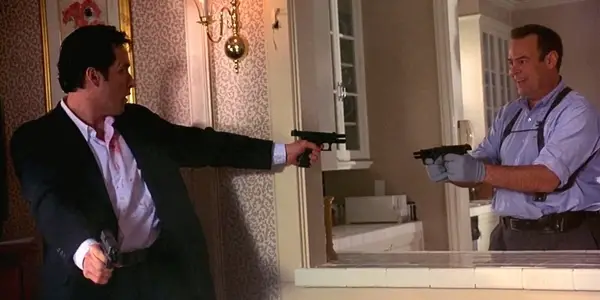
The final example of Martin’s attempt at explaining what he does for a living comes directly after the arrival of this intimate knowledge when Debi confronts him about what she had just witnessed. Something remarkable happens in this scene which needs to be quoted here at length:
Debi: “He was gonna kill you, right?”
Martin: “Yes.”
“It wasn’t the other way around?”
“No. That wasn’t my intention.”
“Is it something you’ve done”
“It’s something I do…professionally. For about five years now.”
(crying) “You were joking. People joke about the horrible things that they don’t do, they don’t do them! It’s absurd!”
“When I left I joined the army and when I took the service exam, my psych profile fit a certain ‘moral flexibility’—would be the only way to describe it. I was loaned out to a CIA-sponsored program and we sort of found each other. It’s the way it works.”
“So you, you’re a government spook?”
“Yes, I mean, no, I was before but I’m not now. Uh, but that’s all irrelevant, really. Governments, nations, it’s all public relations theory at this point.”
“Don’t! I don’t want to hear about the theories; I want to hear about the dead people. Explain the dead people. Who do you kill?!”
“That’s very complicated, but, in beginning, it’s important to have something that matters—to hang onto—you know, a specific ideology to defend, right? I mean, taming unchecked aggression, that was my personal favorite. Other guys like ‘live free or die,’ but you get the idea, but that’s all bullshit and I know that now. That’s all bullshit, you do it because you were trained to do it, you were encouraged to do it and, ultimately, you know, you get to like it. (pause) I know that sounds bad.”
“You’re a psychopath!”
“No, no, no! Psychopath kills for now reason. I kill for money, it’s a job…that didn’t sound right…uhhh, let me see if I can put it another way. If I show up at your door, chances are you did something to bring me there. I mean, everyone’s doing it! It’s like the natural order. I mean states do it, sometimes there’s due process and sometimes pilots carpet bomb cities, you know. Riot…cops shoot demonstrators, that’s indiscriminate, I don’t do that!! You should read the files on some of these f*ckers, I mean it reads like a demon’s resume! Look, I’ve bottomed out here, I’ve lost my taste for it completely. That’s why I came back and I wanted to see you, I wanted to start over, leave that behind…”
“Ohhhhh, so I’m part of your romantic new beginning, right??”
(Hesitates and starts to speak)
“How come you never learned that it was wrong, that there are certain things that you do not do? You do not do in a civilized society!”
“What civilizations are we talking about?”
“You shut up!! Shut Up! Everything about you is a lie. Everything! Stay away from me!”
What this dialogue seems to show is that once a person becomes known, intimately in all of their ugliness and brokenness, by another person, there is no refuge, no escape, from the truth of who they are and, therefore, what they do. All of the justifications he tosses out to Debi in this dialogue feel like mere excuses—last-ditch efforts to soften the blow of the witnessed truth about Martin. But none of them work. It doesn’t even seem like Martin is convinced by his own words, especially when he finally tells her that once he had been trained to kill, he got to where he liked it. At that point, he even came to the realization that with every “It’s not me” and “It wasn’t me” that he spoke, he had been lying to himself. It was personal, it was him that killed those people and he enjoyed killing those people.
Through the recognition of this truth, though ugly, he finally comes to the realization that he was more than just an instrument. He did have culpability and that he couldn’t escape the weight of the morality of his work, of killing all of those people, justified or not. He could no longer live in the disconnect of what he did for a living and who he actually was. He could justify his actions with all of the rhetoric he could use, but, at the end of the day, he was simply a killer, ugly and blunt. And he would not have ever come to that personal and intimate conclusion if he had not been found out and left no places of refuge to run off to.
After this conversation, and the loss of Debi, he decides to finally look at the target that he was supposed to delete while in Detroit, something he had been avoiding during the whole trip. The “canary that decided to sing” was Bart Newberry, Debi’s father. At the point of no return and no longer able to justify his actions or hide who he was from those he loved, he decides to do something that he was never able to do in his line of work, saving the target instead of killing him. As Martin finds Bart running down the street to his death—at the hands of Grocer and his henchmen—Bart sees the file that Martin slaps in his lap and says, “Design department wants to kill me over a leaky sunroof? That why you want to kill me?” and Martin responds once again with his mantra, “It’s not me! Why does everyone think it’s personal?!” For the first time, he says this in the film and it loses its element of self-deception. In this one case, it really isn’t him, instead, he is trying to save him from being killed. During the final gunfight between Martin and Grocer (and his men), Martin tells of being moved by watching the sun set over an ocean and getting the feeling that maybe there was a God or higher power and finally declares, “I mean, I am working on the whole redemption thing.”
Once he had become known by those who loved him and cared for him and become unable to use his previous justifications to buffer himself from the truth. He was then able to see the truth that could set him free, that could put him on the road to redemption.
Violence as a Mode for Redemption
Grosse Pointe Blank does not avoid the harsh truth of the reality of violence done in the world, whether between countries, people, or the very violence we do to ourselves internally by our natural ability to justify our actions and worst inclinations. A person who is constantly living a lie, often to the point of actually believing the lie, is always on the psychological edge of a breakdown. And, yet, on some level this is the condition of all of us. Each one of us is living a self-imposed lie; none of us are completely truthful to others or to ourselves. We all share in Martin Blank’s declaration of “It’s not me!” None of us want to behold who we really are, because it is ugly and condemning, we would rather direct our gaze onto someone else’s faults—replacing our log for their splinter.

However, redemption here requires violence. It may not always be physical, but the act of jarring us out of the lies we tell ourselves and others is brutalizing to our beings. Being found out for the poor judgment and the wrong actions we have partaken in never feels good. There is a reason why our natural response at the moment is to lash out or to turn inwards as we attempt to find shelter from the storm. Yet being known by another in all of our brokenness is the only way that life can move forward, otherwise, we are consciously or subconsciously chained to our past in perpetuity, never free of them, always feeling their force.
And this is the only way that other people can truly enter into our lives in any meaningful sense. Relationships live and die on vulnerability and transparency. The ability to see the real person, positives and negatives—and sometimes the deeply problematic areas—allows for the hope of grace and forgiveness. The ability for that other person to come into our context, share in our linguistic meaning, and choose to love us regardless is deeply redemptive to our beings. Martin Blank, by the end of Grosse Pointe Blank, is actively chosen by Debi even though she is fully aware of all of the violence he has done in the world. Because he is now known by her, ugliness and all, they can share in the meaning of their actions going forward.
Language is something that is taken for granted but is so deeply powerful to the human experience. It is an essential element of human connection. Our lives were being depleted and abstracted from us without the ability to create meaning with other people; to enter into the sacred spaces of another person’s context and share their burden. Put simply, to truly know them.
In my own religious tradition, this violence of being takes on a physical and spiritual element along with the linguistic and existential violence that is showcased in the film. The semiotic melding of salvation, wood, blood, and eventual resurrection cannot be understood nor signify any type of transformative meaning, unless, like Martin Blank, we are seen for who we really are and given no roads of escape from the ugly truth. Given no forms of justification for who we are and what he has done. We must stand guilty, with blood on our hands, before, in my own case, God and, for all of us, our own communities before we can be redeemed and given the freedom and a way to, in the words of Debi Newberry, “get the hell out of town.”
What do you think? Does Grosse Point Blank‘s central character achieve some sort of redemption?
Grosse Pointe Blank is currently streaming on HBO Go.
Does content like this matter to you?
Become a Member and support film journalism. Unlock access to all of Film Inquiry`s great articles. Join a community of like-minded readers who are passionate about cinema - get access to our private members Network, give back to independent filmmakers, and more.
Blake I. Collier hails from the flatlands of the Texas Panhandle, but currently resides in Tulsa, Oklahoma with his wife and son. He draws lines (and the occasional circle) for his day job. He has written for various websites mostly about horror and film, but occasionally about the other various facets of existence. He is co-host of So Grosse Such Pointe Much Blank, a podcast focusing specifically on the 1997 film, Grosse Pointe Blank. He, also, has a chapter on QAnon and the 2008 film, Martyrs, in Toxic Cultures: A Companion from Peter Lang Publishing. You can reach him at [email protected].






